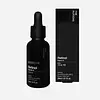What's inside
What's inside
 Key Ingredients
Key Ingredients

 Benefits
Benefits

 Concerns
Concerns

 Ingredients Side-by-side
Ingredients Side-by-side

Water
Skin ConditioningButylene Glycol
HumectantPropanediol
SolventGlycerin
HumectantPentylene Glycol
Skin ConditioningNiacinamide
Smoothing1,2-Hexanediol
Skin ConditioningSodium Hyaluronate
HumectantHydrolyzed Sponge 0.5%
Skin ConditioningBeta-Glucan
Skin ConditioningSodium Carbomer
Emulsion StabilisingCaprylic/Capric Triglyceride
MaskingBifida Ferment Filtrate
Skin ConditioningGalactomyces Ferment Filtrate
HumectantLactobacillus Ferment
Skin ConditioningSaccharomyces Ferment Filtrate
HumectantHydrogenated Lecithin
EmulsifyingGlyceryl Caprylate
EmollientGellan Gum
Ammonium Polyacryloyldimethyl Taurate
Emulsion StabilisingRetinol 0.1%
Skin ConditioningHydrolyzed Collagen
EmollientAmmonium Acryloyldimethyltaurate/Carboxyethyl Acrylate Crosspolymer
Polyglutamic Acid
Skin ConditioningAdenosine
Skin ConditioningDisodium EDTA
Ethylhexylglycerin
Skin ConditioningWater, Butylene Glycol, Propanediol, Glycerin, Pentylene Glycol, Niacinamide, 1,2-Hexanediol, Sodium Hyaluronate, Hydrolyzed Sponge 0.5%, Beta-Glucan, Sodium Carbomer, Caprylic/Capric Triglyceride, Bifida Ferment Filtrate, Galactomyces Ferment Filtrate, Lactobacillus Ferment, Saccharomyces Ferment Filtrate, Hydrogenated Lecithin, Glyceryl Caprylate, Gellan Gum, Ammonium Polyacryloyldimethyl Taurate, Retinol 0.1%, Hydrolyzed Collagen, Ammonium Acryloyldimethyltaurate/Carboxyethyl Acrylate Crosspolymer, Polyglutamic Acid, Adenosine, Disodium EDTA, Ethylhexylglycerin
 Reviews
Reviews

Ingredients Explained
These ingredients are found in both products.
Ingredients higher up in an ingredient list are typically present in a larger amount.
1,2-Hexanediol is a synthetic liquid and another multi-functional powerhouse.
It is a:
- Humectant, drawing moisture into the skin
- Emollient, helping to soften skin
- Solvent, dispersing and stabilizing formulas
- Preservative booster, enhancing the antimicrobial activity of other preservatives
We don't have a description for Ammonium Acryloyldimethyltaurate/Carboxyethyl Acrylate Crosspolymer yet.
Beta-Glucan is a polysaccharide. It can be derived from the cell walls of seaweed, oats, yeast, and fungi. It hydrates the skin and helps boost your skin's natural barrier.
As an antioxidant, beta-glucan helps fight free-radicals. Free-radicals are molecules that may damage your skin cells, such as pollution.
Studies show this ingredient may be an effective wrinkle reducer as it can deeply penetrate into skin. It has also been show to help with wound healing.
Learn more about Beta-GlucanThis ingredient is an emollient, solvent, and texture enhancer. It is considered a skin-softener by helping the skin prevent moisture loss.
It helps thicken a product's formula and makes it easier to spread by dissolving clumping compounds.
Caprylic Triglyceride is made by combining glycerin with coconut oil, forming a clear liquid.
While there is an assumption Caprylic Triglyceride can clog pores due to it being derived from coconut oil, there is no research supporting this.
Learn more about Caprylic/Capric TriglycerideHydrogenated Lecithin is created from the hydrogenation of lecithin (a group of phospholipids). Hydrogenation is a chemical reaction between hydrogen and another element.
This ingredient is an emollient and emulsifier. As an emollient, it helps soften skin by trapping moisture within. As an emulsifier, it prevents oil and water ingredients from separating.
Pentylene glycol is typically used within a product to thicken it. It also adds a smooth, soft, and moisturizing feel to the product. It is naturally found in plants such as sugar beets.
The hydrophilic trait of Pentylene Glycol makes it a humectant. As a humectant, Pentylene Glycol helps draw moisture from the air to your skin. This can help keep your skin hydrated.
This property also makes Pentylene Glycol a great texture enhancer. It can also help thicken or stabilize a product.
Pentylene Glycol also acts as a mild preservative and helps to keep a product microbe-free.
Some people may experience mild eye and skin irritation from Pentylene Glycol. We always recommend speaking with a professional about using this ingredient in your routine.
Pentylene Glycol has a low molecular weight and is part of the 1,2-glycol family.
Learn more about Pentylene GlycolPropanediol is an all-star ingredient. It softens, hydrates, and smooths the skin.
It’s often used to:
Propanediol is not likely to cause sensitivity and considered safe to use. It is derived from corn or petroleum with a clear color and no scent.
Learn more about PropanediolRetinol is a gold-standard ingredient for anti-aging. It is a form of Vitamin A and belongs to the class of retinoids that also includes tretinoin.
Why is retinol famous?
It has the most scientific studies backing up its skin benefits out of all the non-prescription ingredients.
Retinol is proven to:
This is why retinol is effective at removing wrinkles, fading dark spots, treating acne, and reducing the appearance of pores.
Studies show retinol is less effective when exposed to UV. Be sure to look for appropriate packaging to keep your retinol potent (similar to Vitamin C).
Using retinol or any retinoids will increase sun-sensitivity in the first few months. Though studies show retinoids increase your skin's natural SPF with continuous use, it is best to always wear sunscreen and sun-protection.
We recommend speaking with a medical professional about using this ingredient during pregnancy.
Retinol may cause irritation in some people, so be sure to patch test. Experts recommend 'ramping up' retinol use: start using this ingredient once a week and work up to using it daily.
Read about Tretinoin
Learn more about RetinolSodium Hyaluronate is hyaluronic acid's salt form. It is commonly derived from the sodium salt of hyaluronic acid.
Like hyaluronic acid, it is great at holding water and acts as a humectant. This makes it a great skin hydrating ingredient.
Sodium Hyaluronate is naturally occurring in our bodies and is mostly found in eye fluid and joints.
These are some other common types of Hyaluronic Acid:
Learn more about Sodium HyaluronateWater. It's the most common cosmetic ingredient of all. You'll usually see it at the top of ingredient lists, meaning that it makes up the largest part of the product.
So why is it so popular? Water most often acts as a solvent - this means that it helps dissolve other ingredients into the formulation.
You'll also recognize water as that liquid we all need to stay alive. If you see this, drink a glass of water. Stay hydrated!
Learn more about Water